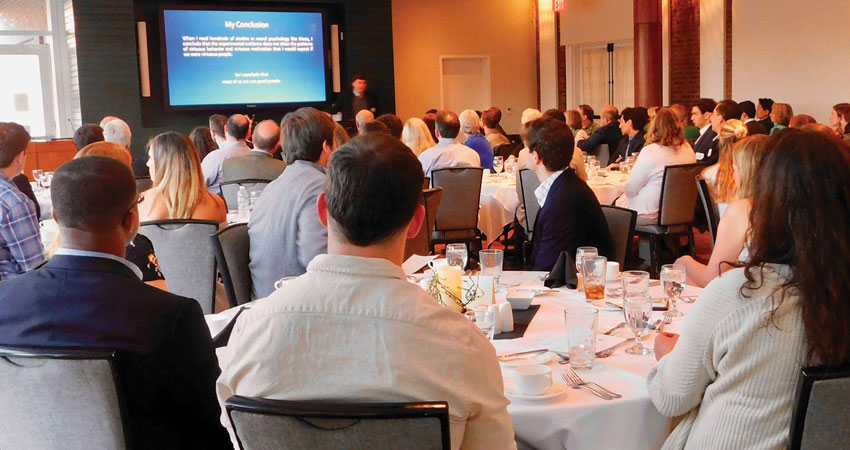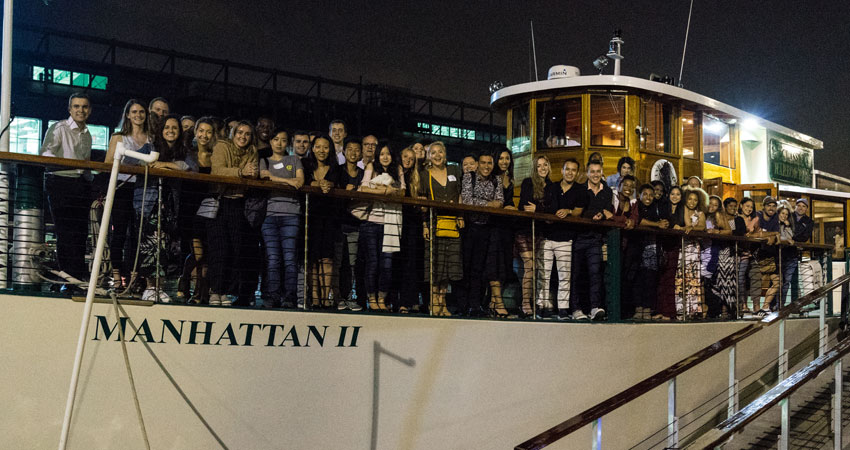Dartmouth Roundtable Dinner Features Dr. Henry Clark
By Tom Campisi, Managing Editor

In observance of the college’s 250th anniversary celebration, the Dartmouth Roundtable Dinner discussion focused on founder Eleazar Wheelock and the Ethics of Commemoration.
Dr. Henry Clark, the director of Dartmouth’s Political Economy Project, gave the opening remarks and launched a discussion for an audience of Dartmouth professors, administrative leaders, local pastors and professionals, and student leaders. The roundtable dinners are hosted twice a year by Integrare, a campus ministry.
“On campus, secular scholars often do not have a lot of encounters with people of faith who are thinking very deeply,” said Kent Dahlberg, the director of Integrare.
Clark began the evening by giving attendees a chance to ponder the ethics of commemoration, pointing out psychologist Daniel Kahneman’s distinction between slow thinking and fast thinking. The latter is prevalent on social media.
The ethics of commemoration calls for slow thinking, said Clark. The professor said that anything old enough to be commemorated passes through four phases: resistance, acceptance, celebration, and alienation, “which sometimes moves all the way to rejection.” He used the example of Christopher Columbus as a historical figure who has gone through all four phases, including rejection, in the United States—noting how the nation once celebrated him with a national holiday that closed schools.
Regarding Wheelock, “few people, to my knowledge, would want to go all the way to the rejection phase in thinking about [him] and the college he founded, but it’s a sign of the times that there are at least four reasons, that I’m aware of, why some of our contemporaries feel an unmistakable sense of alienation about his project,” said Clark.
Those four reasons, according to Clark, are:
Wheelock altered his original plan for a Native American school and replaced it with one that catered mostly to English settlers.
He was a slave owner, despite hailing from Connecticut, which generally did not have plantation slavery.
Wheelock was a relentless religious proselytizer, which in our secular age exposes him to the charge of “cultural imperialism.”
Though a man of the cloth, “he was an operator who sometimes had to make unedifying compromises with the ways of the world.”
While acknowledging Wheelock’s faults, “we certainly need to stare these aspects of his and our past in the face, but perhaps not so intently as to lose all peripheral vision,” Clark said. “Likewise, if we look closely at ourselves, I believe we will find some hidden affinities between Wheelock’s enterprises and our own.”
Clark credited Wheelock with having an inclusive agenda, “not dramatically different from what one would find emanating out of Dartmouth’s Parkhurst Hall, even today.”
The inspiration for Wheelock’s departure from cultural norms at the time sprang from the Great Awakening tradition, which sought to “include every person in conversion, regardless of sex, race, and status,” Clark said. “It was a major influence in the lives of women, and female education was a noted priority of the first school Wheelock founded. One reason Wheelock conceived of an Indian school was in reaction against the chauvinism of many English settlers, more eager for revenge than reconciliation.”
At the roundtable, Clark presented a reading from noted global historian Jack Goldstone entitled, “1769 and the Rise of Machines: Mechanical, Scientific, and Political.” Goldstone will be a featured speaker when the Political Economy Project hosts its academic conference on September 27-28 entitled Dartmouth and the World: Political Economy in Thought and Action @1769.
“Dartmouth’s founding — like that of America’s science-based government and the origins of modern science-based engineering — was part of the movement that literally created the modern world and changed the position of Western Civilization within world history,” Goldstone wrote.
Like many fledgling universities at the time, and like the founding fathers, Wheelock had “a deep skepticism about established, inherited authority and a commitment to local autonomy, initiative, and popular participation in Church affairs,” Clark said.
He credited Wheelock with thinking in “entirely up-to-date economic, political, even strategic terms.”
“Wheelock was a man of his times not only in his demerits, but in his merits as well.”



